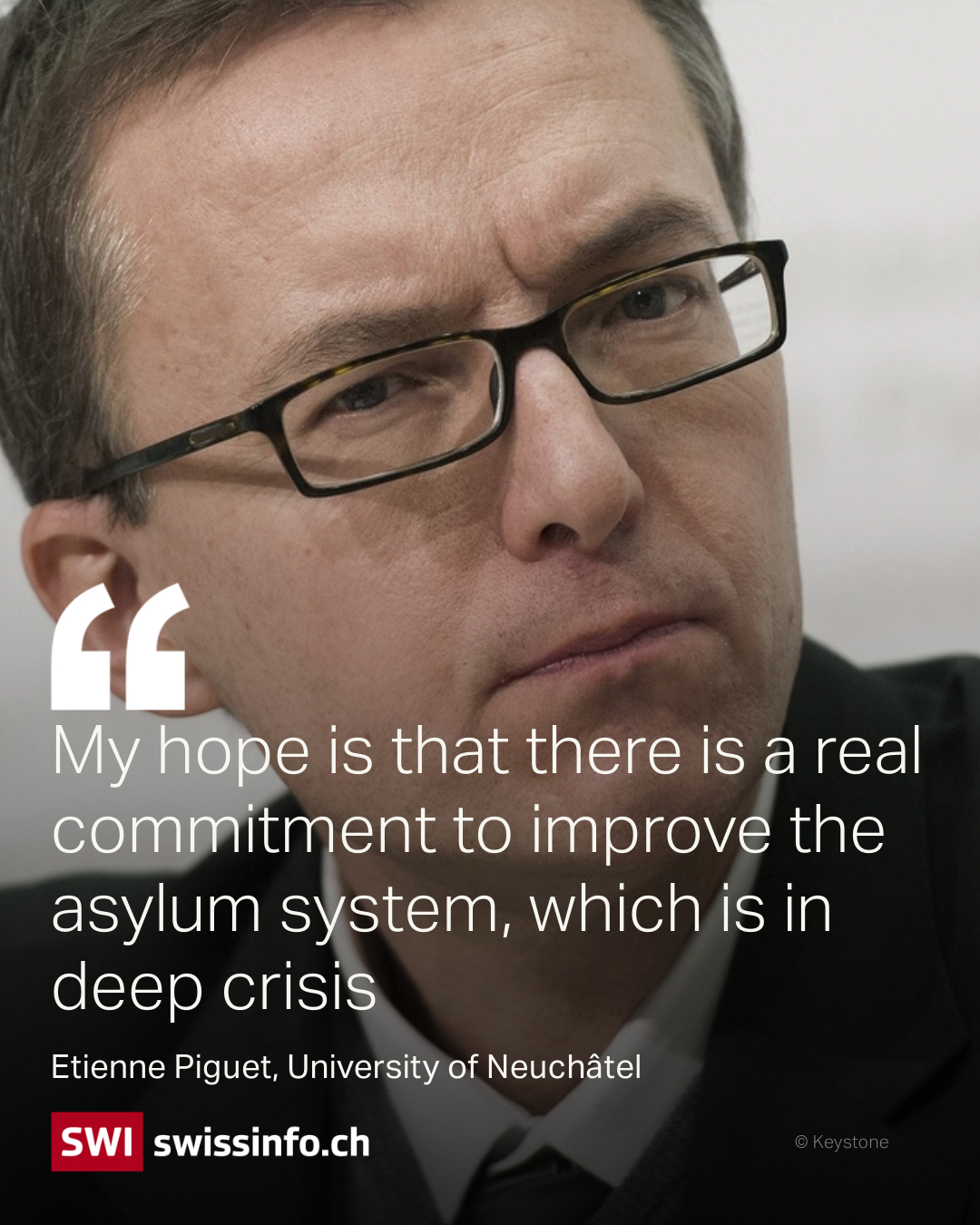
Swiss politicians debate sending rejected Eritreans to third country

Last Friday, a Swiss parliamentary committee backed a plan to relocate some Eritreans with rejected asylum applications to a third country, such as Rwanda.
Questions remain on the feasibility of the proposal and whether Switzerland is taking cues from the United Kingdom’s Rwanda bill.
What is the Swiss proposal about?
A committee in the Swiss House of Representatives has given the green light to a motion presented by Petra Gössi, a member of the centre-right Radical-Liberal Party.
The motion calls for Switzerland to make an agreement with a third country to accommodate some 300 Eritrean nationals whose asylum request has been rejected in Switzerland. According to the proposal, this third country would host the Eritreans and take responsibility for obtaining the necessary documentation for their repatriation.
Having already received backing from the Swiss Senate, the proposal will be discussed by the House of Representatives in June.
What is the issue with Eritrean asylum seekers?
The Radical-Liberal Party explains that the reason for this proposal is Eritrea’s refusal to accept non-voluntary asylum returns from any country. As a result, around 300 rejected Eritrean nationals currently remain in Switzerland.
For years, Switzerland has been a sought-after refuge for people fleeing the Eritrean regime. Back in 2012, the Alpine nation accounted for 37% of all asylum applications from Eritreans across Europe. However, following a peak in applications in 2015, Switzerland saw a decline in the number in the following years.
+ Read more about recent clashes among Eritrean groups in Switzerland
What are the arguments for and against the plan?
Advocates of the plan, including the Radical-Liberals and right-wing parties, say the ongoing situation involving Eritrea is untenable and undermines the credibility of the Swiss asylum system. “We need alternative measures to accommodate other refugees who are entitled to asylum in Switzerland,” said Pascal Broulis of the Radical-Liberal party in an interview with Swiss public radio, RTSExternal link.
Broulis also underlined that this measure would send a clear signal that “Switzerland cannot host everyone”. Martina Bicher from the Swiss People’s Party meanwhile told Swiss public television, SRFExternal link, that she hopes the plan could “work as a deterrent”.
However, the government and left-wing parties oppose the idea. Justice Minister Beat Jans said such an agreement would not solve the problem. Eritrea could still refuse to accept the return of its citizens from a third country, at which point they could then simply return to Switzerland.

“This plan is highly problematic, particularly in its feasibility, as finding a country willing to sign the agreement will prove extremely challenging. The idea is still at a very early stage and there have been no proper discussions to back it up. My hope is that it’s not just a way for right-wing parties to show how tough their policies are, but that there is a real commitment to improve the asylum system, which is in deep crisis,” says Etienne Piguet, a professor of “geography of mobilities” at the University of Neuchâtel.
How feasible is the plan?
The legal framework is somewhat intricate. “In principle, it is legally possible to send rejected Eritrean asylum applicants to a third country to which they have a connection and which is deemed genuinely safe. However, the definition of a ‘safe third country’ is already a contentious issue,” explains Cesla Amarelle, professor of migration law at the University of Neuchâtel.
Since 2016, Switzerland has ceased to grant asylum solely on the grounds that Eritreans left their country illegally. Additionally, the Federal Court ruled that the prospect of conscription in Eritrea did not in principle prevent a rejected asylum-seeker from being deported. “Therefore, should this plan progress, the court will need to judge each case individually to determine whether the person faces the risk of torture, degrading treatment or punishment if repatriated,” Amarelle continues.

This implies that Eritreans aged between 20 and 50 cannot be returned to their homeland but could potentially be sent to a safe third country. “If this plan were to be implemented – which seems unrealistic – Switzerland risks being condemned by the European Court of Human Rights if the designated third country is deemed unsafe. Rwanda is not a safe country, as the UK Supreme Court has found,” warns the professor.
Is Switzerland following the European trend of outsourcing asylum processing?
The plan has been compared to the UK’s Rwanda bill, officially signed off last week. However, “the two plans are significantly different, and I would say that the Swiss motion is much more problematic because it involves people who are already in Switzerland,” says Piguet.
While the UK intends to send all asylum seekers who enter the country illegally to Rwanda, the Swiss proposal only targets Eritrean individuals whose asylum applications have been turned down. While Bern has managed the asylum application process within its borders, London aims to outsource it.

More
‘There is no migrant crisis; there is a management crisis’
Still, shifting asylum procedures to the EU’s external border is becoming more and more appealing for European countries. Italy has signed such an agreement with Albania and last year the EU signed one with Tunisia, which was strongly criticised by human rights organisations.
Is the idea new in Switzerland?
A similar proposal was previously put forward by the Radical-Liberals last year but was rejected by the Swiss House of Representatives in December. Former Justice Minister Elisabeth Baume-Schneider argued at the time that the legal basis for such a project was lacking.
Supporters of the plan argue that there is a precedent. In 2003, Switzerland signed such an agreement with Senegal, but it never came to fruition after Senegal later withdrew from the deal.
Readmission agreements are by no means new, and Switzerland has already signed several such deals. For example, in 2011, Switzerland signed a deal with Tunisia, whereby the Alpine Nation agreed to an exchange programme for young professionals on short-term visas while the North African country agreed to re-admit rejected asylum seekers. However, much like the current proposal involving Eritreans, the agreement came under fire from human rights activists.
Is the Swiss-Tunisian migration partnership truly a ‘win-win’ relationship?
Edited by Marc Leutenegger/dos

In compliance with the JTI standards
More: SWI swissinfo.ch certified by the Journalism Trust Initiative



























You can find an overview of ongoing debates with our journalists here . Please join us!
If you want to start a conversation about a topic raised in this article or want to report factual errors, email us at english@swissinfo.ch.